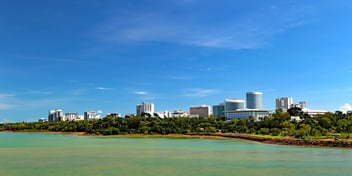Revitalising water in the NT

A transformation is underway in the Northern Territory with key changes and updates to legislation, funding and management of water in the north. These changes arise from the Territory’s Water Plan, launched in June 2023, where the NT Government pledged to conduct a comprehensive review of water resource laws.
The plan is the first of its kind in the NT, offering a sustainable strategic framework for the NT Government and its partners. At its heart is the principle of water security, defined as ensuring an acceptable quantity and quality of water for people, economic opportunities, cultural and environmental needs, both now and in the future.
Targeted reforms to the Water Act have recently been enacted to enhance water resource management in the Territory. In summary, through the Parks and Water Legislation Amendment Bill 2024:
- The roles of the Controller of Water Resources (Controller) and the Minister will be more distinctly separated, ensuring the Controller's independence.
- Compliance and enforcement tools will be modernized and strengthened, improving the Act's enforceability.
- The Northern Territory Civil and Administrative Tribunal (NTCAT) will assume responsibility for reviewing water decisions, replacing the Minister, thereby enhancing efficiency and consistency.
- Clear arrangements for transitioning to a water-licensing framework are established.
These changes continue the program of incremental improvements to the Water Act that began in 2017. Further details on the amendments can be found in the NT Government’s Information Paper.
The Northern Territory Government has also recently published the first annual Progress Report for the Territory Water Plan and the accompanying Monitoring and Evaluation Framework that will be used to assess the Plan’s effectiveness after three years.
The 2024 report highlights several key initiatives:
- Drafting has begun on a new Safe Drinking Water Bill.
- Secured investment from the National Water Grid Authority to upgrade and replace water infrastructure in remote communities, as well as fund science projects to enhance water resource modeling.
- Significant milestones achieved for the Darwin region water supply program, including regulatory approvals to commence work on returning Manton Dam to service and planning for the Adelaide River Off-Stream Water Storage (AROWS).
- Water savings achieved through Power and Water initiatives such as the Schools Water Efficiency Program.
The Monitoring and evaluation framework, published in conjunction with the progress report, will be used to evaluate the NT Government's progress toward long-term outcomes and priority areas. It identifies baseline data and key questions that need to be answered to measure the plan's progress and success over time. By assessing the plan's outcomes after three years, the NT Government can determine where additional action may be necessary.

